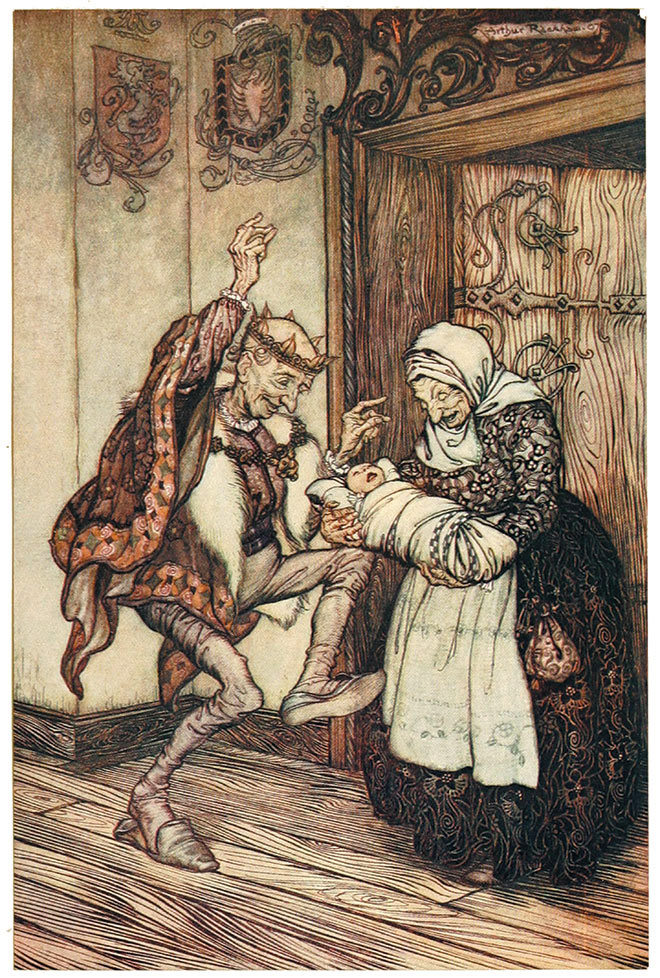La Bella Addormentata – Part 1 Posted by Serena on Jan 12, 2018 in Italian Language
Last November, we published a translation of the traditional folk tale Cappuccetto Rosso (Little Red Riding Hood). This proved very popular, and we had requests for more of the same. So, here’s another old favourite, La Bella Addormentata (Sleeping Beauty).
This was my favourite fairy tale when I was a child, it didn’t scare me like many other fairy tales did, and I loved the image of the tower in the forest where the beautiful princess slept. Here’s the original version by the Brothers Grimm, translated into English by Margaret Raine Hunt in 1884. There will be five episodes, one per week. The Italian translation is my own.
Part 1.
In times past there lived a king and queen, who said to each other every day of their lives, “Would that we had a child!” and yet they had none. But it happened once that when the queen was bathing, there came a frog out of the water, and he squatted on the ground, and said to her: “Thy wish shall be fulfilled; before a year has gone by, thou shalt bring a daughter into the world.”
Tanto tempo fa c’erano un re e una regina, i quali tutti i giorni si dicevano l’un l’altra, “Se solo avessimo un bambino!” ma malgrado ciò non arrivava. Ma accadde che un giorno, quando la regina faceva il bagno, dall’acqua uscì una rana, e si accovacciò per terra, e le disse: “Il tuo desiderio sarà soddisfatto; prima che un anno sia passato, darai alla luce una figlia.”
And as the frog foretold, so it happened; and the queen bore a daughter so beautiful that the king could not contain himself for joy, and he ordained a great feast. Not only did he bid to it his relations, friends, and acquaintances, but also the wise women, that they might be kind and favourable to the child. There were thirteen of them in his kingdom, but as he had only provided twelve golden plates for them to eat from, one of them had to be left out.
E come aveva predetto la rana, così accadde; e la regina partorì una figlia così bella che il re non riusciva a contenersi dalla gioia, e ordinò una grande festa. Non solo invitò i suoi parenti, gli amici e i conoscenti, ma anche le fate, affinché fossero benevole e propizie alla neonata. Nel suo reame c’erano tredici fate, ma poiché egli aveva apparecchiato con piatti d’oro solo per dodici, una di loro dovette essere esclusa.
However, the feast was celebrated with all splendour; and as it drew to an end, the wise women stood forward to present to the child their wonderful gifts: one bestowed virtue, one beauty, a third riches, and so on, whatever there is in the world to wish for.
Comunque, la festa fu celebrata con grande splendore; e come si avvicinò alla conclusione, le fate si fecero avanti per presentare alla neonata i loro doni meravigliosi: una le elargì la virtù, una la bellezza, una terza la ricchezza, e così via, tutto ciò che si può desiderare a questo mondo.
And when eleven of them had said their say, in came the uninvited thirteenth, burning to revenge herself, and without greeting or respect, she cried with a loud voice: “In the fifteenth year of her age the princess shall prick herself with a spindle and shall fall down dead.” And without speaking one more word she turned away and left the hall.
E quando undici avevano detto la loro, ecco che arrivò la tredicesima che non era stata invitata e ardeva dal desiderio di vendicarsi, e senza salutare o rendere omaggio, disse a voce alta: “Nel suo quindicesimo anno di età la principessa si pungerà con un fuso e cadrà morta.” E senza proferire un’altra parola si voltò e lasciò il salone.
Everyone was terrified at her saying, when the twelfth came forward, for she had not yet bestowed her gift, and though she could not do away with the evil prophecy, yet she could soften it, so she said: “The princess shall not die, but fall into a deep sleep for a hundred years.”
Alle sue parole tutti rimasero terrorizzati, quando la dodicesima si fece avanti, poiché non aveva ancora elargito il suo dono, e sebbene non potesse annullare la funesta profezia, tuttavia poteva mitigarla, per cui disse: “La principessa non morirà, ma cadrà in un sonno profondo per cento anni.”
End of Part 1.
You can read all the other chapters by clicking on the following links:

Build vocabulary, practice pronunciation, and more with Transparent Language Online. Available anytime, anywhere, on any device.





Comments:
Jill:
Much enjoyed, thank you. Jill
andrei:
Molto bello e utile/
Grazie infinite
Saluti da Andrei
Sue Gollop:
Hurray-something for my U3A classes today who are beginning to contemplate the subjunctive and the past historic! Thank you. Love your posts which I use so often here in our Bridlington U3A classes. Only sorry I don’t tell you often enough how much I value your blogs
Serena:
@Sue Gollop Sono contenta che i miei articoli ti siano d’aiuto, Sue. Tanti auguri per la tua classe d’italiano.
A presto.
Serena